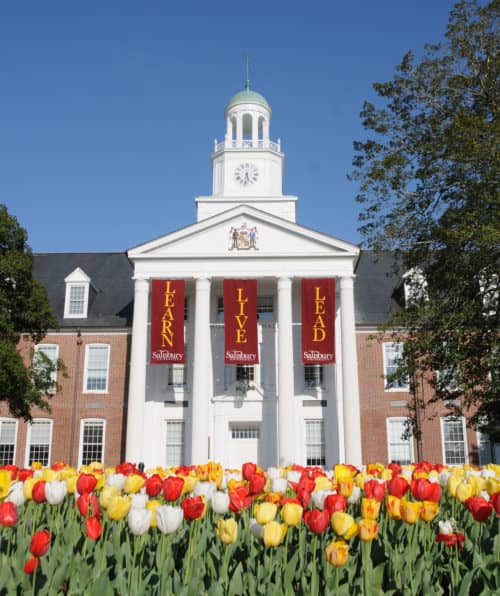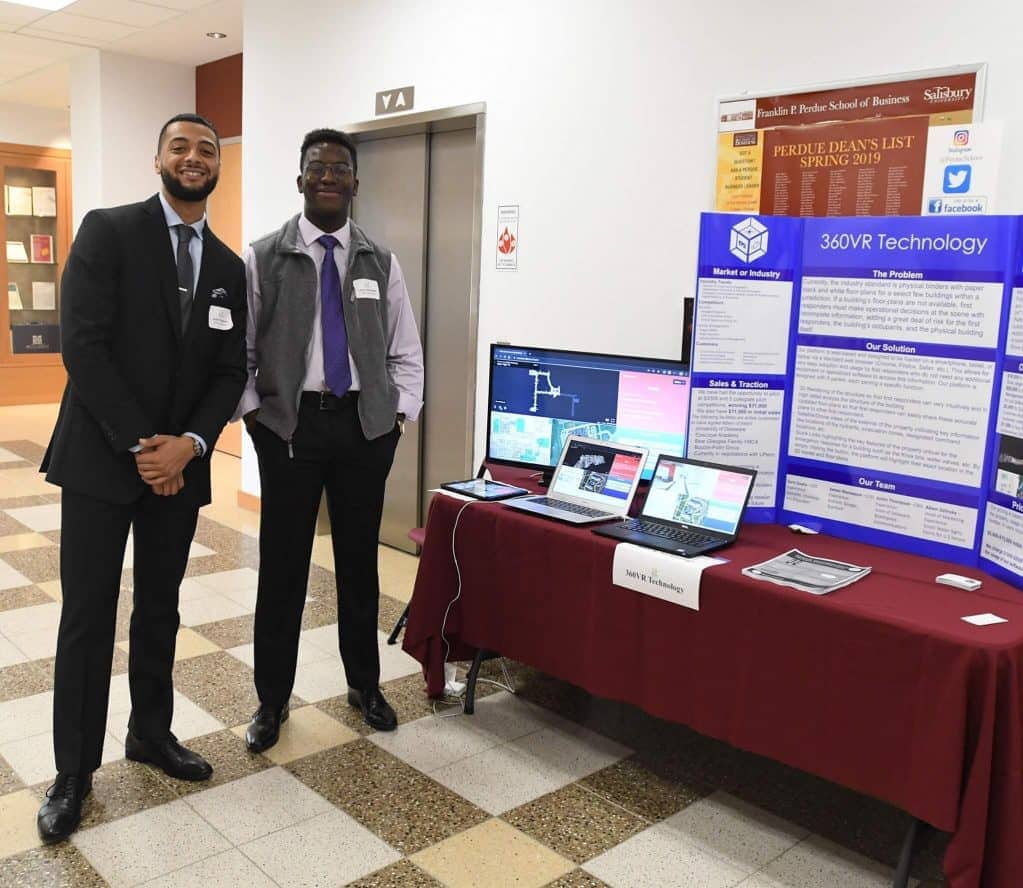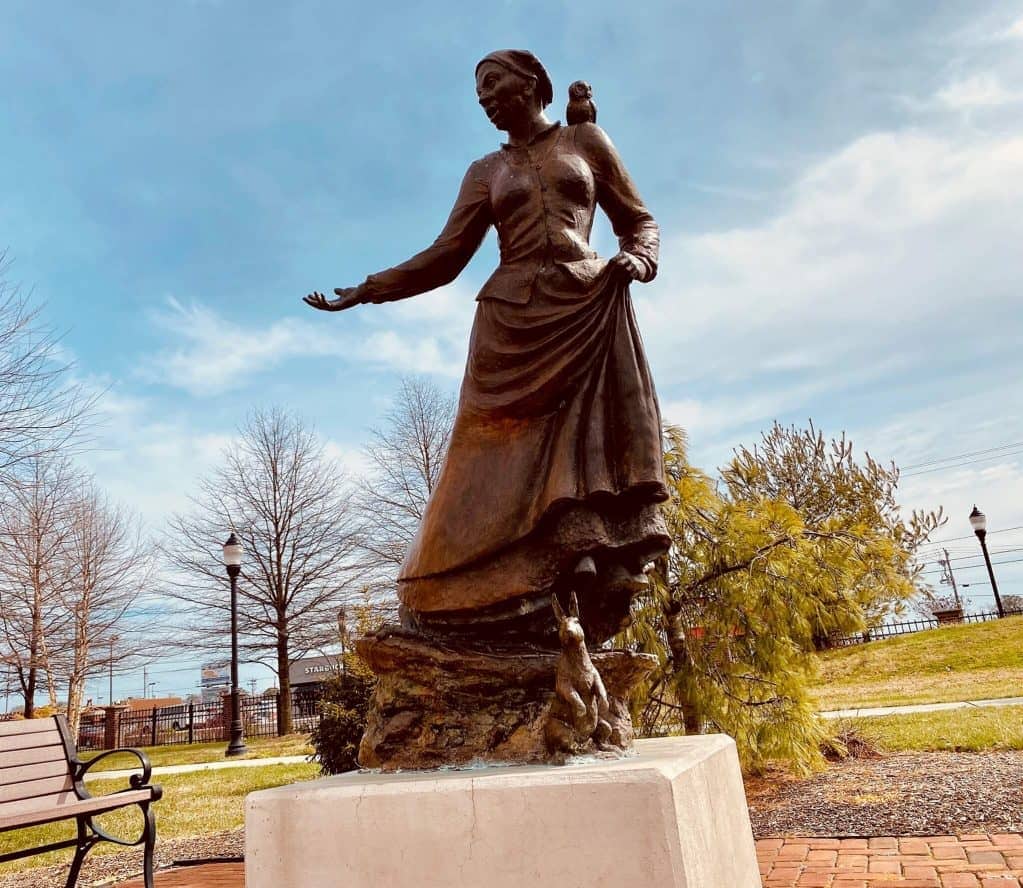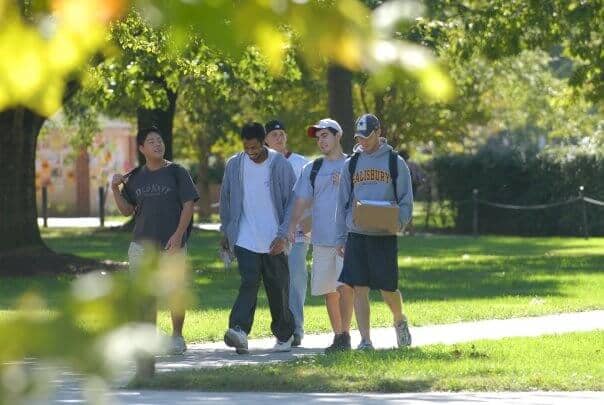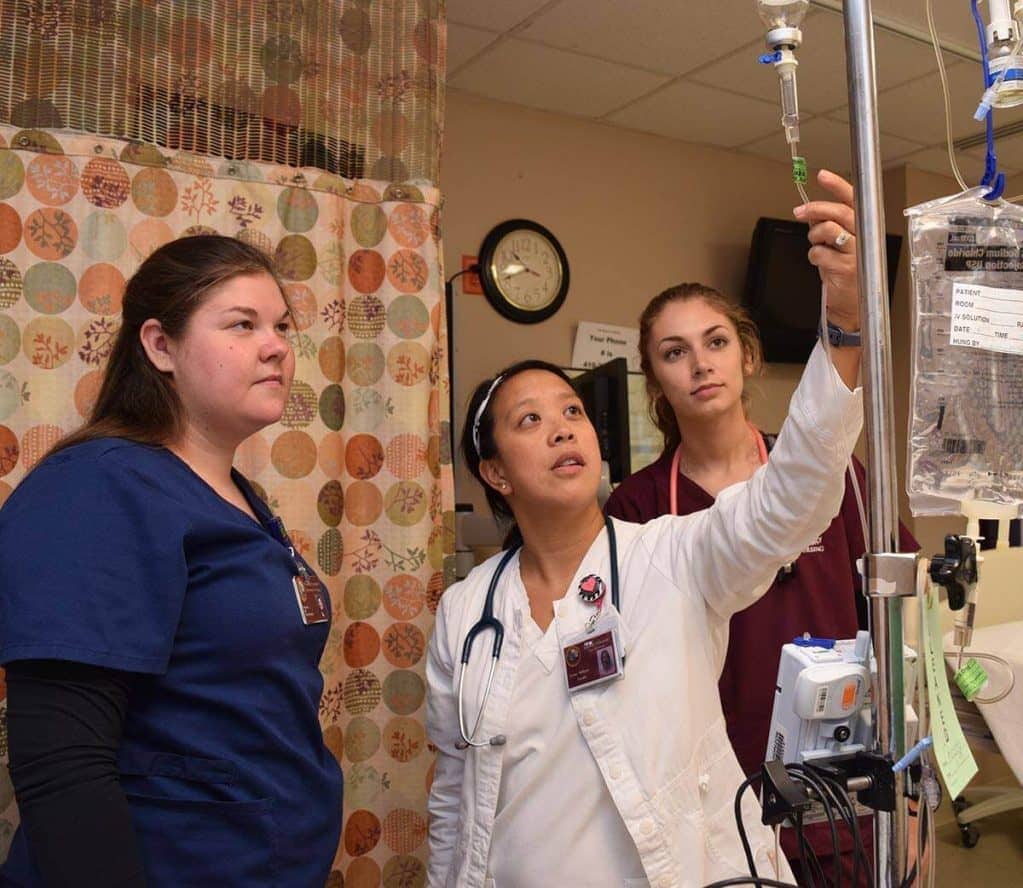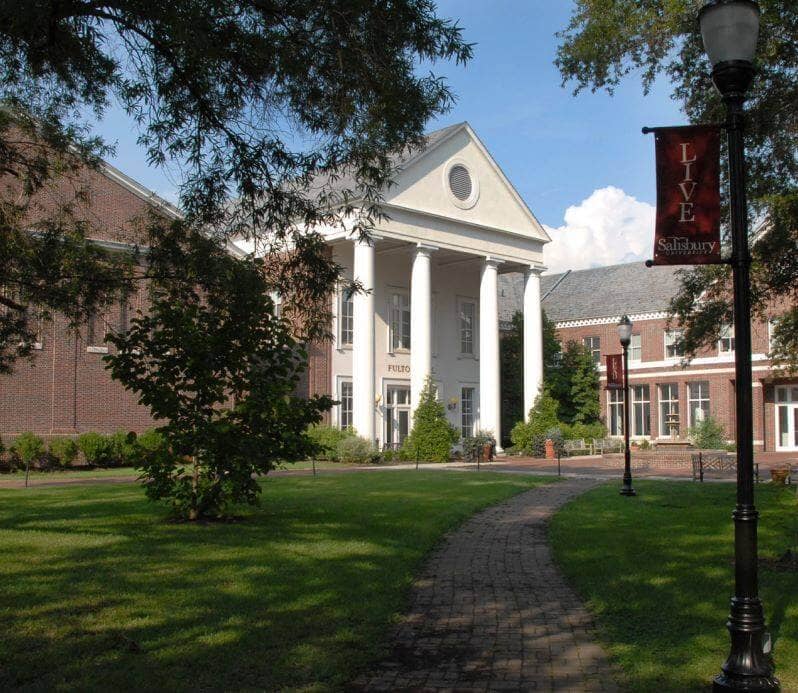Salisbury University
Salisbury, Maryland

Learn. Live. Lead.
Salisbury University (SU) is nationally recognized for academic excellence. Its creative curriculum emphasizes undergraduate research, study abroad, professional internships, and civic engagement. Located on Maryland’s historic Eastern Shore, SU offers 43 undergraduate majors and 17 graduate programs, including a Doctor of Nursing Practice and a Doctor of Education program.
Get to know Salisbury University
Benefits
Student Activities
- Campus Ministries
- Choral groups
- Concert band
- Dance
- Drama/theatre
- International Student Organization
- Jazz band
- Literary magazine
- Model UN
- Music ensembles
- Musical theatre
- Opera
- Pep band
- Radio station
- Student government
- Student newspaper
- Student-run film society
- Symphony orchestra
- Television station
Campus Resources
- Career Services
- Writing Center
- Academic Advisors
- Library Services
- Disability Services
- Health Services
- Counseling
College Highlights
GLOBAL CITIZENS
A major part of the SU mission is to prepare global citizens. Education majors have taught elementary students in New Zealand, while others have studied children’s literature in Ireland and Wales. Nursing students have provided aid and education to villagers in Africa, and business students have studied economics in France and South Africa. Other students have spent spring break helping with service projects in Costa Rica and Mexico. One philosophy professor even took a group to Japan to explore humanity’s spiritual relationship with nature while hiking and maintaining pilgrimage trails.
World leaders consistently visit campus, too; speakers have included Nobel Peace Prize winners as well as former presidents Lech Walesa of Poland, F.W. de Klerk of South Africa, and José Ramos-Horta of Timor-Leste.
STUDY ABROAD
Study abroad is possible during the summer and winter sessions or for an entire year. Semester-long Salisbury Abroad programs make it possible to study in Ecuador, Estonia, China, and Spain, all at the same cost of tuition at SU. Through SU’s Bosserman Center for Conflict Resolution, students have researched, taught, and mediated disputes in contentious areas, including Israel, Kosovo, Bosnia, and Northern Ireland. The University’s Center for International Education, as well as its English Language Institute and International Student and Scholar Services Office, offer resources for students and faculty both at SU and abroad.
“When we were in Florence I actually got to see Michelangelo’s David. He is massive … the pictures do not do him justice. It’s a humbling experience to go see the art you learn about.” – Anna Prado, SU Art Major
PACE
SU’s 8,700 students are active citizens locally, nationally, and internationally. Through the Institute for Public Affairs and Civic Engagement (PACE), students engage in the political process, intern for state and local governments, and attend national political conventions. Many PACE students are involved in intensive, multi-faceted, year-long civic experiences through the Presidential Citizen Scholars Program.
COMMON INTELLECTUAL EXPERIENCES
In addition to a civic reflection program for new students, SU’s Sophomore Year Experience provides additional opportunities for students to have shared experiences in their second year. And throughout their time at SU, students are also encouraged to take advantage of the University’s Cultural Laureate Program, which gives recognition to those who attend a certain number of SU-sponsored cultural events, such as performances, exhibits, and academic lectures.
CLASS SIZE
The number of sections of each class size.
2-9: 85 | 10-19: 302 | 20-29: 354
30-39: 241 | 40-49: 36 | 50-99: 27 | 100+: 13
ENROLLMENT BY ETHNICITY
Nonresident aliens: 1%
Hispanic/Latino: 4%
Black or African American, non-Hispanic: 14%
White, non-Hispanic: 71%
American Indian or Alaska Native, non-Hispanic: 1%
Asian, non-Hispanic: 4%
Native Hawaiian or other Pacific Islander, non-Hispanic: 0%
Two or more races, non-Hispanic: 3%
Race and/or ethnicity unknown: 3%
With its award-winning faculty, a beautiful campus with national arboretum status, exceptional academic and athletic programs, and a dynamic administration, Salisbury is earning recognition as A Maryland University of National Distinction.
UNDERGRADUATE RESEARCH
Nationally lauded for its dedication to undergraduate research, SU offers students multiple opportunities to assist professors in research as well as perform their own independent studies. Findings are presented on campus during the annual Student Research Conference, and many student-scholars also speak at national and international conferences. SU has twice hosted the National Conference on Undergraduate Research.
OFF-CAMPUS LEARNING
Much of the learning at Salisbury takes place outside the classroom. Students have assisted with field work both in local old-growth forests as well as in Amazon rainforests. They have also worked inside the Henson Science Hall labs, researching nerve development and preparing payloads for NASA rockets in order to test the effects of cancer metastasis in zero gravity.
APPLIED EDUCATION
Students across disciplines can apply their studies through internships and field placements, all of which are strongly encouraged. In the Perdue School of Business, for example, all majors must complete an applied business learning experience, many of which lead to success in national sales and marketing competitions. Student entrepreneurs may compete for their share of up to $100,000 in cash and in-kind services during annual entrepreneurship competitions. Nursing students consistently have the highest 10-year average pass rate in the University System of Maryland on the National Council Licensure Examination for Registered Nurses (NCLEX), having out-performed all B.S.- and B.S.N.-granting nursing programs in the state for the past four years. Other programs also provide unique benefits. The SU Honors College, for example, offers thriving seminars and small discussion-oriented classes.
“In addition to wonderful professors, Salisbury University has tons of resources. For example, I took a history class and was able to go to SU’s Nabb Research Center for Delmarva History and Culture and have my hands on primary sources that are hundreds of years old.” – Alexis Larson, SU Conflict Analysis and Dispute Resolution Major
HONORABLE FACULTY
Faculty include many Fulbright scholars, winners of state and national teaching honors, and arts awards. The most popular majors at SU are biology, exercise science, nursing, communication arts, and elementary education.
LEARNING COMMUNITIES
First-year students with similar interests may reside and study together through SU’s Living Learning Communities. Topics include art, biology, communication arts, elementary education, secondary education, entrepreneurship, explorers (learning about multiple majors and community service opportunities), global village, green (eco-friendly), honors (multiple communities available), human services, music, theatre, STEM (science, technology, engineering and mathematics), and wellness.
SPECIAL STUDY OPTIONS
Programs available at this institution.
Accelerated program
Cooperative education program
Cross-registration
Distance learning
Double major
Dual enrollment
English as a Second Language (ESL)
Exchange student program (domestic)
Honors Program
Independent study
Internships
Student-designed major
Study abroad
Teacher certification program
“We provide a curriculum that embraces all of the human experience across cultures and time, and our students take full advantage of the rich learning opportunities we offer.” – Dr. Maarten Pereboom, Dean of SU’s Fulton School of Liberal Arts
In creating a stimulating campus climate, SU not only involves its students, faculty, and staff, but it also reaches out to the community at large.
SERVICE
The University’s Volunteer Center is committed to serving the community by offering meaningful connections between students who care and organizations in need. Among its goals is to foster student development through leadership and service.
Student organizations are heavily involved with the Sea Gull Century, SU’s annual 100-mile or 100-kilometer bike ride, which attracts thousands of cyclists from across the U.S. with an economic impact of some $7 million on the Lower Eastern Shore.
Hundreds of SU students give back to the area annually through I Love Salisbury and The Big Event community cleanup initiatives. SU’s award-winning Relay For Life is consistently named one of the top collegiate Relays, raising nearly $1.4 million for the American Cancer Society since 2002. SU also is home to ShoreCorps/PALS, an AmeriCorps chapter that allows young adults to mentor students in local schools.
Salisbury’s Division III athletics teams are also engaged in the community, offering sports clinics and sponsoring toy and food drives for needy families. The field hockey team, women’s soccer, and volleyball teams have volunteered for Habitat for Humanity and breast cancer awareness fundraisers, and baseball and football players have mentored area students to help with reading and making healthy choices.
CULTURAL FULFILLMENT
Culturally, SU offers a wide array of activities each semester through its University Galleries and Cultural Affairs programs. Past speakers have included environmentalist Jane Goodall, author and Nobel laureate Toni Morrison, Grammy winner Mary Youngblood, feminist pioneer Gloria Steinem, and journalist Robert MacNeil. Monks from the Deprung Loseling Monastery in Tibet have regularly visited the campus for week-long residencies.
STUDENT ACTIVITIES
SU is home to two National Public Radio affiliates, a student radio station, and state-of-the-art broadcasting studios. Students participate in a multitude of musical ensembles, including the Chorale and Chamber Choir and the Salisbury Symphony Orchestra. Students also perform in several productions annually through the Bobbi Biron Theatre Program.
SCHOOL LOCATION
Home to a growing downtown area, the City of Salisbury is located on Maryland’s scenic Eastern Shore. The campus is 30 miles from the Atlantic beaches, and just a few hours from major metropolitan areas, including Baltimore, Washington, D.C., and Philadelphia.
ATHLETICS
NCAA Division III, Capital Athletic Conference and Eastern College Athletic Conference
21 intercollegiate varsity teams
10 men’s: baseball, basketball, lacrosse, soccer, swimming, tennis, football, indoor and outdoor track and field, cross country
11 women’s: basketball, field hockey, lacrosse, cross country, soccer, softball, swimming, tennis, indoor and outdoor track and field, volleyball
Club and intramural sports also are available.
Sea Gull teams wearing the maroon and gold have won 21 national championships, as well as individual championships in track and field.
RESIDENCE LIFE
Percent of students living on campus.
First-time, first-year (freshman) students: 89%
Undergraduates: 29%
Campus housing options.
Coed dorms
Apartments for single students
Special housing for disabled students
Theme housing
Wellness housing
INTERNSHIPS AND PRACTICUMS
SU’s Career Services Office calls internships “the single most important thing you can do to gain career-related experience.” Internships and practicums are mandatory for some majors and strongly recommended for all. Students graduating from SU’s Franklin P. Perdue School of Business, for example, are required to have an Applied Business Learning Experience (ABLE) that includes both a faculty-guided class and a work-site internship. In the Charles R. and Martha N. Fulton School of Liberal Arts, practicums are required for communication arts students, while political science students have internship opportunities with elected officials at the local, state, and national levels. Conflict analysis and dispute resolution majors have interned around the world, including the Hague, while environmental studies students have interned through fellowships at the U.S. Environmental Protection Agency.
Through the College of Health and Human Services, nursing and medical careers students intern at area hospitals and train through SU’s Henson Medical Simulation Center. Social work majors perform supervised field work, and athletic training students have worked with major and minor league teams and SU’s own Sea Gulls. Students in the Richard A. Henson School of Science and Technology have interned with the National Institutes of Health and joined surgeons for global medical missions.
In the Samuel W. and Marilyn C. Seidel School of Education, education students intern in area schools through SU’s national award-winning Professional Development School Program. This is just a sampling of the many internship opportunities available to SU students.
“The support from the professors here at SU has been tremendous. Their guidance has helped build a foundation for me to excel and I look forward to the next steps in my career.” – Jeremy Gencavage, SU Graduate Student, Geographic Information Systems Management
CAPSTONE COURSES AND PROJECTS
Many majors and programs offer students the opportunity to complete capstone projects. Senior art majors, for example, may showcase their works in solo or group exhibitions on campus (which often also include installation and promotion), while music majors often perform senior recitals. Similarly, the SU Honors College allows students to complete capstone projects related to their individual courses of study. All majors are invited to submit research papers and scholarly posters for presentation at SU’s annual Student Research Conference.
Admissions
ADMISSIONS FACTORS
Very Important
Rigor of secondary school record | Academic GPA
Important
Class rank | Standardized test scores
Considered
Application Essay | Recommendation(s) | Extracurricular activities
Talent/ability | Character/personal qualities | First generation
Alumni/ae relation | Geographical residence | State residency
Religious affiliation/commitment | Racial/ethnic status | Volunteer work
Work experience | Level of applicant’s interest
FRESHMAN PROFILE
SAT Evidence-Based Reading and Writing
25th Percentile: 575 | 75th Percentile: 640
SAT Math
25th Percentile: 570 | 75th Percentile: 640
ACT Composite
25th Percentile: 18 | 75th Percentile: 25
ACT Math
25th Percentile: 18 | 75th Percentile: 25
ACT English
25th Percentile: 20 | 75th Percentile: 25
Tuition & Cost
Tuition (in-state): $7,122
Tuition (out-of-state): $16,824
Fees: $2,702
Room & Board: $11,950
Room: $6,950
Board: $5,000
What Others are Saying
Contact Salisbury University
Contact Admissions
salisbury.edu/admissions
(410) 543-6161
admissions@salisbury.edu
Campus Information
1101 Camden Avenue
Salisbury, MD 21801
(410) 543-6000
